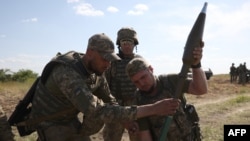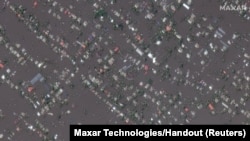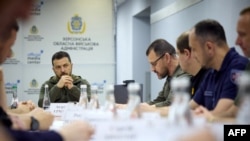Latest developments:
- Ukrainian officials said Friday the country’s military shot down four Russian missiles and 10 drones overnight in central Ukraine.
- U.S. President Joe Biden to host NATO chief Jens Stoltenberg for talks Monday with support for Ukraine at the top of the agenda ahead of next month's NATO summit
- South African President Cyril Ramaphosa's office said Thursday he spoke by phone with Russian President Vladimir Putin about the upcoming visits to Russia and Ukraine by a delegation of African leaders who are seeking to help resolve the conflict.
Ukraine on Thursday appeared to be launching its long-anticipated counteroffensive to try to recapture land in the eastern and southern parts of the country that Russia seized in the earliest weeks of the war more than a year ago.
The Kyiv government made no announcement of its battlefield movements but its forces mounted a major attack with tanks and armored vehicles in the southern region of Zaporizhzhia. Russia said it thwarted Ukraine's initial advance, maintaining the territorial status quo.
Ukrainian officials have for months talked about a counteroffensive as they mobilized units trained by the West and collected new weaponry from the United States and European allies. Russia has said that in recent days Ukraine has attacked front lines held by Moscow's troops in the east and south in intensified fighting.
Ukraine could be involved in a monthslong effort to recapture the 20% of its country controlled by Russia.
It appears one direction of the attacks is southward toward the Sea of Azov, an effort to knock out a bridge that links mainland Russia with the Crimean Peninsula, which Moscow seized in 2014 and is a critical base for its ongoing military operations.
Ukrainian President Volodymyr Zelenskyy said Thursday he visited the Kherson region, where thousands of people are coping with flooding following the destruction of the Kakhovka dam.
The hydroelectric dam collapsed Tuesday, with Russia and Ukraine blaming each other for the destruction.
Zelenskyy shared a video on Telegram of him meeting with officials and said they discussed evacuations, restoring the region's ecosystem and the military situation in the area.
The director general of the International Atomic Energy Agency Director General Rafael Mariano Grossi said in a statement that the Zaporizhzhya Nuclear Power Plant near the destroyed dam "is continuing to pump cooling water from the Kakhovka reservoir even though the water level has reached the point at which it was previously estimated that the pumps could no longer operate."
"This is providing some more time before possibly switching to alternative water supplies" located near the plant, Grossi said. He said the alternative supplies of water "can provide required cooling water for the Zaporizhzhya Nuclear Power Plant for several months." He added, however, that, "The general nuclear safety and security situation remains very precarious and potentially dangerous."
The French Institute of Radiological Protection and Nuclear Safety gave a similar assessment of the damage to the dam and the consequences to the Zaporizhzhya plant, saying in a statement that there is currently no short-term risk to the nuclear power plant.
Some information in this report came from The Associated Press, Reuters and Agence France-Presse.







